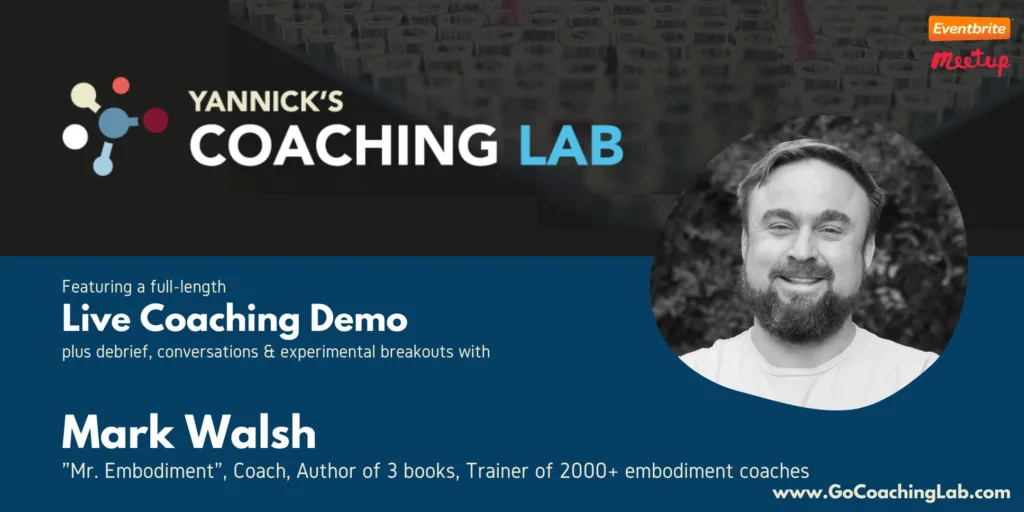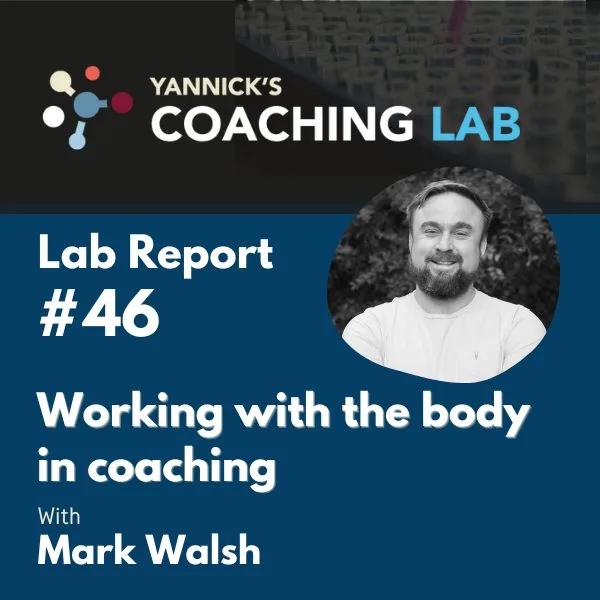
Yannick’s Coaching Lab features guest coaches from a broad variety of approaches, who showcase how they work as part of a live 45min coaching session, followed by reflections and Q&A with the audience.
Curious to know what this session was like? Have a peek at the Lab Report below or consider VIP membership to access the full recording of this and many more exciting sessions.
Yannick’s Coaching Lab #46 — Mark Walsh
Lab Report by Natalie Fraser
Session Summary
Mark’s client came to today’s session hoping to gain confidence being seen, being heard, and speaking out. She feels that she has a lot to say but struggles with confidence to express herself publicly. Mark immediately reassured her that this is an extremely common experience. Significantly, Mark reframed ‘confidence’ for his client, recognizing that having ‘limited confidence’ is a natural part of being human and being humble. He noted the relationship between competence and confidence. He also shared that people’s appearance of confidence is not necessarily an accurate reflection of their true state. This enabled his client to take some pressure off herself, and for realistic expectations of their coaching goals to be explored. Throughout the session, Mark gave space to both ‘content’ dialogue and ‘embodied’ insights, bringing his client’s awareness to her body and using felt messages and insights to guide the coaching. Beyond this, when sensing his client may benefit from grounding or calming herself Mark guided her through centering to connect with the relevant part of her body (example: hand on heart, deep breath). This session offered deeper insight into her barriers, and practical resources to take-away from the session to increase self-care and self-confidence.
Key Moments
Mark began by acknowledging the context of the session (being coached in front of an audience), addressing the limitations of confidentiality and abnormality of being witnessed.
“Who’s the boss?” “Anything I suggest is just a suggestion” Mark set the scene by very clearly outlining his perception of power dynamics in the coaching relationship.
“Fun and Chill” being the first day back after Christmas holidays, Mark proposed a direction for the session that welcomed challenging emotions yet invited a fun, playful ambience.
A Centering Exercise was used to begin the session, with a specific focus on “something that makes you smile” before exploring hopes for the session. This was also used to return to a calmed state during the session.
“What happens in your body when…”-type questions enabled Mark to bring his client’s awareness from the content to their body
Psychoeducation was an especially valuable component of Mark’s coaching. He used this quite frequently for a variety of reasons including to: normalize embodied responses, explain his client’s reactions and patterns, educate the ‘whys’ of certain reactions. For example: “this is a basic mammalian response to [an anxiety provoking situation]”
A somatic break was taken in the middle when Mark recognized they’d been doing a lot of work, allowing movement to release tension and recalibrate them both
Resources to take away were clearly offered, with the reminder that the key is PRACTICE:
– Centering
– Normalize “hey it’s normal” self-love
– Embodiment Practice – taking up space – using a role model as inspiration (e.g. Freddie Mercury)
Demonstrations of embodied postures (e.g. confident stretched arms) were often used to provide visual examples which his client was invited to mirror. They then explored her embodied and felt experience of taking on these postures, at times contrasting this with its ‘opposite’ posture (e.g. shrinking small) and exploring the contrasting felt sense.
“I will, rather than I might.” Mark was strict, with humor and gentleness, at the end of the session in his request that his client make a realistic promise towards herself about what she will be walking away with.
Insights & Take-aways
Awareness and choice is at the basis of all Mark’s coaching.
The body is an unfiltered way of telling our story.
Mark emphasized the ethical importance of a session’s contracting and context when deciding where to take the session, choosing not to explore a likely-emotional topic in this session due to its public setting and the suggestion to keep the session light.
Deep emotional insight can be gained from acknowledging a somatic experience without needing to explore the details of its meaning.
Mark uses jokes as resources to keep his clients in a lighter, more playful state of learning rather than a state of flight, trauma, or shutdown
“What’s too much, what’s too little?” is an important question for somatic coaches to consider, especially when observing and assessing how their clients are responding to being held in certain postures.
Trusting the client and not being too pushy is an important attitude that Mark trains in his coaches.
When discussing Mark’s presence as a coach, he reflected that kindness, awareness, and authenticity guide his ability to worth with people form drastically different cultures.
Mark considers psychoeducation as a valuable way of helping clients in a focused and efficient way, rather than
For people to be teachable they need to not know things – cultures and attitudes of ‘already knowing everything’ can be barriers towards openness to effective somatic coaching.
Acknowledging the problem often alleviates the barriers that clients/audiences may have
Calibrating to the group and culture is an important part of building rapport.
A list of all available recordings can be found at https://bit.ly/LabRecordings
This Lab Report was authored by Natalie Fraser
Natalie is an existential Counselling Psychologist, specialising in trauma and transformation, and curious about coaching. Interested in exploring life’s Big Questions? Find out more at: www.existentialofferings.com

